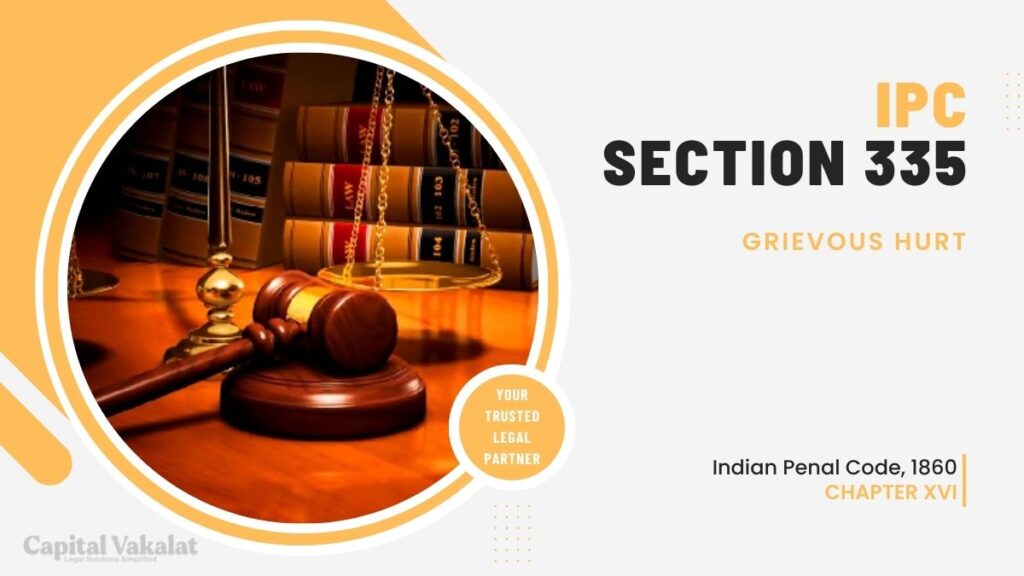In the realm of criminal law, Section 335 of the Indian Penal Code (IPC) holds a significant place, addressing the act of voluntarily causing grievous hurt on provocation.

This article delves into the nuances of this legal provision, aiming to provide a comprehensive understanding of its elements, implications, and real-world applications.
Understanding Section 335 IPC
Section 335 IPC defines the offense of voluntarily causing grievous hurt on provocation. To establish an offense under this section, certain elements must be met, including the presence of provocation and the infliction of grievous hurt. It is crucial to grasp the intricacies of these elements to comprehend the scope and implications of the law fully.
Voluntary Actions Leading to Grievous Hurt
Voluntarily causing harm is a fundamental aspect of criminal law. Understanding the distinction between simple hurt and grievous hurt is essential in the context of Section 335 IPC. The severity of the injury plays a pivotal role in determining the gravity of the offense, and the law acknowledges the significance of the accused’s intent.
Provocation in Legal Context
Provocation, as a legal concept, is multifaceted. In the context of Section 335 IPC, it involves acts or circumstances that lead an individual to lose control and commit an act of grievous hurt. Defining and identifying provocation is a crucial aspect of prosecuting or defending cases under this section.
Linking Provocation to Grievous Hurt
Establishing a connection between provocation and the commission of grievous hurt is central to cases falling under Section 335 IPC. Legal precedents and case studies serve as valuable tools in understanding how the courts interpret and apply the law in situations where provocation plays a role in causing severe harm.
Case Studies
Examining real-life examples adds a practical dimension to the theoretical understanding of Section 335 IPC. Notable cases where individuals have been charged under this section provide insights into the complexities of the law and the diverse scenarios in which it can be invoked. Analyzing the outcomes and judgments in these cases enhances our comprehension of the legal landscape.
Legal Consequences
The legal consequences of violating Section 335 IPC are significant. Penalties and punishments associated with voluntarily causing grievous hurt on provocation can range from fines to imprisonment. The article explores the various factors considered in determining the severity of the punishment and how mitigating circumstances may influence sentencing.
Challenges in Prosecution
Prosecuting offenses under Section 335 IPC comes with its set of challenges. Establishing the presence of provocation and proving the accused’s intent can be complex. This section also allows for legal defenses, and understanding these aspects is crucial for both prosecutors and defense attorneys involved in such cases.
Recent Developments and Amendments
In the ever-evolving landscape of legal statutes, staying informed about recent developments and amendments is vital. Any changes in the language or interpretation of Section 335 IPC can have a substantial impact on how the law is applied. This section of the article explores updates that may influence the understanding and application of the law.
Conclusion
In conclusion, a nuanced understanding of Section 335 IPC is essential for legal practitioners, scholars, and the general public alike. This article has explored the elements of the offense, the role of provocation, real-world examples, legal consequences, challenges in prosecution, and recent developments. As we navigate the complexities of criminal law, a thorough grasp of such provisions ensures a just and equitable legal system.
Frequently Asked Questions
What distinguishes simple hurt from grievous hurt in the context of Section 335 IPC?
The severity of the injury is the key factor. Grievous hurt involves more serious injuries, such as the impairment of a body part or risking the victim’s life.
Are there any specific scenarios where Section 335 IPC is frequently applied?
Cases involving altercations, fights, or situations where an individual causes severe harm in the heat of the moment, often invoking the defense of provocation.
How do recent amendments impact the application of Section 335 IPC?
Amendments may introduce clarifications, widen or narrow the scope of the section, or address loopholes. Staying updated on these changes is crucial for legal practitioners.
Can a person be charged under Section 335 IPC even if there was no intent to cause grievous hurt?
Intent is a crucial element, but the circumstances and the degree of harm caused play a significant role. Accidents or unintended consequences may be considered in the legal process.